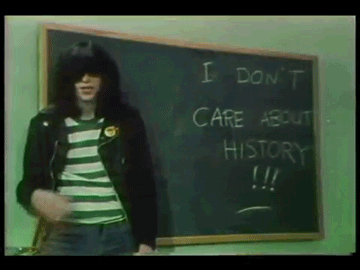Lit and Crit
Phil Collins and
Genesis:
The Apostle's
Guide

Continued from pg. 4
After that, there was a six year period where everything Phil Collins touched turned platinum. No wonder there was a backlash, he was ubiquitous! There he was, flying from London to the USA to play both Live Aids. There they were, releasing and scoring American hits with toss-off outtakes via Three Sides Live.
Actually, the fourth side's new songs are quite good in their own way, featuring more of what sound like Duke-era arrangements and more lyrics about lost love or innocence. The difficult hard-scrabble rural life ala 'The Roof Is Leaking' which invited pity as a strong response to his persona was revisited again on Me and Virgil. Perhaps it was such songs which gave someone in Hollywood the idea that he could play a character like 'Buster' as he did in such songs.
Then suddenly Phil was playing with Robert Plant on his solo albums. And there he was, releasing ballad after ballad from all those movie soundtracks, exploring the abandoned lover themes he was famous for. And it all worked, it all sounded real and believable.
He released Hello I Must Be Going, and the anger on I Don't Care Anymore was explosive. By this time, give any American in the country a song with that drum sound and they would have been able to tell you it could be no one else but Phil.
This was breakup album #4, and it was less wounded and more about rebounding since it was in fact about his second divorce. It was rad, it was righteous! Thunderous, full and booming.
He was snarling at his lovers now, in the anger stage of grievance, tired of bargaining, growling in a way that we knew the burn area was still kind of tender. Other times, he was just as exhausted and bereft of comfort as he had revealed himself to be deep down in his moments of solace before the piano in the past (Don't Let Him Steal Your Heart Away, etc).
The drummer in him would come out on the jam tunes and the pop artist in him would abuse Motown some more (sweetly, at first), and he even let out a little bit of a dark English humor, so let's face it, America: he had the whole package. He was firing --or weeping-- on all cylinders by this point. And it was real, and it rocked, and it worked, and it was good.
So there he is on 1985's Easy Lover, jamming with Phillip Bailey and Earth Wind and Fire and upping his RnB quotient little by little. It was light but it was fun and punchy, no harm in it. There he is producing Eric Clapton. There he is doing a cameo appearance on Miami Vice. There he is scoring hits for Howard Jones. Giving an old Abba girl a hit with Freida. There he is playing drums for Adam Ant and releasing a new album with Genesis.
That new album was another blockbuster with something for everyone. It had the anguished Phil of Mama (another scorned lover song mistaken for one about abortion, but nonetheless crying out for human connection in a way only he could) and the easily digestible uber-pop of That's All. It's too saccharine for my tastes, but relentless in its ability to work pitiable pleas and simple refrains into pithy top pop.
He was in his prime, and I was in high school. I can remember my friend Lance coming over to my house with that album in tow. On the cover were what looked like children's blocks or shapes, simple and appealing to anyone (and a clue to the nature of the music inside). We let it slide, because there was Phil going full-tilt plead at the top of his lungs again. All was well.
Mama seemed to explore the machine-like mechanical synth style starting to appear in the new wave dance music of the time, so we couldn't be sure if this was fresh, or not? Perhaps it was, though its reflexively simple eight-bit two measure lo-fi clink noise riff (a formula to be repeated on 'Tonight Tonight Tonight' as well to some degree) was maybe slightly grating. Still, its crescendo offered more signature Drum Phils ™.
"Genesis" a decent album, but somehow this was indeed the beginning of the end for Phil Collins as a genuine artist though it wasn't apparent on the surface. Now, he was in some ways an industry unto himself, focused on broad appeal as the foremost concern.
As anyone who is successful will tell you, keep doing what works. For Phil, that was songs about heartbreak and witnessing crimes. And that's it.That's basically all he's ever had in terms of subjects to sing about well.
Any attempt to deviate from that winning formula for Phil Collins just might end in disaster. The song Illegal Alien is an excrement-laced jingle. Meanwhile, Just A Job To Do, again about perusing an unknown criminal (or whatever) to justice, mines the same theme as In The Air Tonight, yet it sounds like a TV cop show version.
Home By The Sea is somewhat tuneful and has some extended bridge pretensions and elicits a little sympathy for the old home folks, but it is not a major work. It offers too little melodic development by a tad even while showing a sure sense of how to move various sections toward sonic resolution.
Well, the good news was this wasn't another breakup album.
Shop
Extablisment
Album Reviews
Watch
Fiction
New Music
VISIT OUR ONLINE STORE FOR A MENU OF PROFESSIONAL SERVICES including
Buy It On Amazon



















